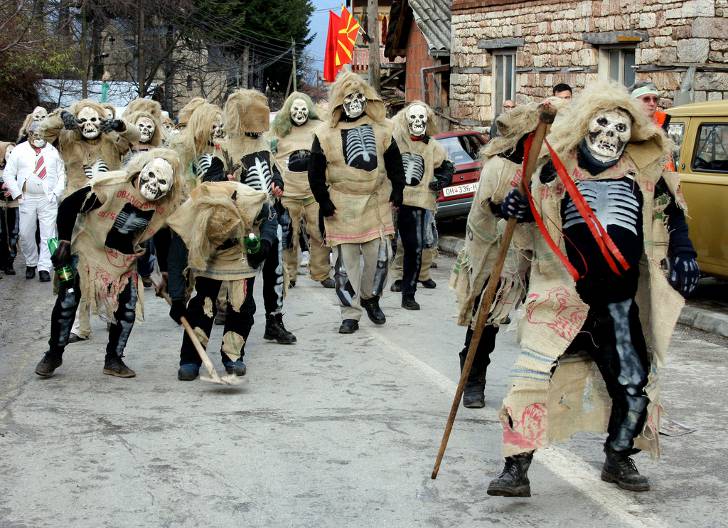It is believed that the village of Vevčani was founded sometime between the 6th and 8th centuries, and its carnival is about just as old as the village itself. The carnival of Vevčani is held to celebrate New Year’s Eve and New Year’s Day according to the Julian calendar. Due to the difference between the Julian calendar and the Gregorian calendar, the carnival falls on January 13 and 14.
The carnival of Vevčani is dedicated to Saint Basil the Great, also known as Basil of Caesarea. His feast day is observed on January 1 in the Eastern Orthodox Church that uses the Julian calendar, which corresponds to January 14 in the Gregorian calendar. The carnival itself, however, is rooted in old pagan traditions.
During the carnival, the entire village transforms into a live theatre. All revelers dress as different characters and wear elaborate masks, some of which are really scary. Traditional characters of the Vevčani carnival include musicians, devils and demons, a bride and a groom, and August the Stupid. Participants begin to prepare masks and costumes months before the carnival and keep them secret until the very last moment. When the carnival is over, all costumes and masks are burned.
The participants of the Vevčani carnival are called vasiličari in honor of Saint Basil (Vasilij in Macedonian). Alongside mythical creatures, the carnival procession features caricatures on politicians and other public figures. Essentially, the carnival of Vevčani is a mix of old traditional culture and political satire of current events. The raucous procession is accompanied by traditional music played on drums and zurlas (a Balkan woodwind instrument). Revelers who don’t have instruments make noise with pans, pots, bells and whatever else they can find.
In 1993, Vevčani officially joined the World Federation of Carnival Cities, which helped boost its popularity. Each year, the small village of Vevčani attracts thousands of tourists from all over Macedonia and abroad.
The 2021 carnival was canceled due to the COVID-19 pandemic, but revelers celebrated it despite the official cancellation and warnings from authorities.

Photo: Emil Chuchkov




